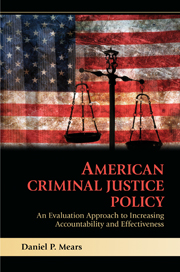 American Criminal Justice Policy
American Criminal Justice Policy Book contents
- Frontmatter
- Contents
- Preface
- 1 Introduction
- 2 Irrational Criminal Justice Policy
- 3 A Solution for Improving Criminal Justice Policy
- 4 Needs Evaluations
- 5 Theory Evaluations
- 6 Implementation Evaluations
- 7 Outcome Evaluations and Impact Evaluations
- 8 Cost-Efficiency Evaluations
- 9 Conclusion
- Notes
- References
- Index
5 - Theory Evaluations
Published online by Cambridge University Press: 05 June 2012
- Frontmatter
- Contents
- Preface
- 1 Introduction
- 2 Irrational Criminal Justice Policy
- 3 A Solution for Improving Criminal Justice Policy
- 4 Needs Evaluations
- 5 Theory Evaluations
- 6 Implementation Evaluations
- 7 Outcome Evaluations and Impact Evaluations
- 8 Cost-Efficiency Evaluations
- 9 Conclusion
- Notes
- References
- Index
Summary
In our everyday lives, most of us face many problems that we work to solve successfully. In trying to address these problems, we consciously or unconsciously use theories to determine how to proceed. For example, we may take a shortcut to work because of a theory that says, “If you take this road, the total distance will be shorter and so you will get to work sooner.” Of course, the theory may be incorrect or incomplete. Distance may influence total travel time, but so, too, might the number of traffic lights along the way. Accordingly, we might revise our theory to take both distance and the number of traffic stops into account. Even so, we could be overlooking some other factor, such as the varying lengths of some traffic lights depending on the time of day. The route we ultimately take may be affected by how we adjust for such possibilities. Of course, in the larger scheme of things, a change in the route we take constitutes but one of several possible strategies we could adopt to ensure that we make it to work on time. For example, we could leave earlier and so allow more time for our commute.
In short, theory describes how we believe the world works. It also describes the way in which a social policy is expected to achieve its goals. The theory may not be fully articulated. It may not even be articulated at all.
- Type
- Chapter
- Information
- American Criminal Justice PolicyAn Evaluation Approach to Increasing Accountability and Effectiveness, pp. 93 - 130Publisher: Cambridge University PressPrint publication year: 2010


